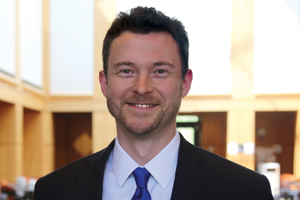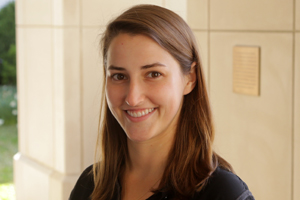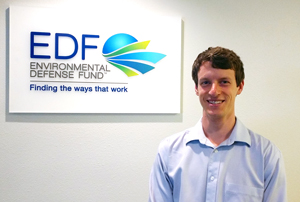Buoyed by increased funding for summer public service jobs, a growing number of second-year students at the University of Virginia School of Law are spending both their first and second summers working in public interest roles.
This summer the Law School and Public Interest Law Association provided more than $568,000 in grants to 137 students working in unpaid or low-paid positions with nonprofits and government agencies.
Guaranteed to all first and second-year students who meet requirements, the PILA grants — combined with UVA Law’s postgraduate fellowships and the newly created Virginia Public Interest Interviewing Program, which funds 2Ls and 3Ls traveling for public service interviews — “reflect Virginia Law’s strong commitment to support the next generation of public service lawyers,” said Annie Kim, assistant dean for public service and director of the Mortimer Caplin Public Service Center.
Close to half of first-years worked in public service internships during the summers of 2016 and 2017, in legal aid organizations and federal government agencies, for public defenders and prosecutors, and for causes as various as the rights of LGBT individuals to racial justice to environmental protection. The school began guaranteeing funding in the summer of 2016.
“In addition to the satisfaction they receive from representing clients and performing high-level legal work for some of the most well-respected public service organizations in the country, these students are gaining the experience they need to be extremely competitive in the postgraduate job market,” Kim said. “Public service employers want not only the best and the brightest — they want a track record that shows you can handle the early responsibility you’ll get as a new attorney.”
For students who plan to start public service careers after law school, like the four featured below who received PILA grants both last year and this year, the 2L summer job can lead to a first job offer.
“Federal government agencies like the U.S. Department of Justice and the Federal Trade Commission often hire 3Ls who worked at their agencies as 2L interns,” Kim said.
Large criminal law offices and postgraduate fellowship organizations, such as the Skadden Foundation, also place a premium on the public service experience gained during the 2L summer when making their hiring decisions.
 Shanthi Rajagopalan
Shanthi Rajagopalan
Rajagopalan’s interest in prosecution led her to work for the Santa Clara County District Attorney’s Office after her first year. She will start her career as a prosecutor next fall at the Contra Costa County District Attorney’s Office as a result of her performance as an intern at the office this past summer.
Hometown: San Jose, California
Education: Hawaii Pacific University, B.A., justice administration
Summer Job: Contra Costa County District Attorney's Office
Favorite thing about your summer job: First, the amazing people in my office and their willingness to help. And second, being in court was awesome. In one court appearance, I had the opportunity to argue in a multiple defendant motion to dismiss involving serious gang-related charges. The courtroom was packed and here I was, as just a law clerk, about to speak on behalf of the government. I felt so nervous and at points during my argument, my nerves did get to me. But nonetheless, everything went well and the experience was truly invaluable.
What I’ve learned: Cases are not just cases. They involve people's lives, every step of the way. It is important to keep that in mind.
The most important experience I have gained from my work: There is always room for more preparation. The trial arena can sometimes — more often than not — be unpredictable, and you have to be extra ready for any issues that may come your way.
What my general workday is like: I would get to work around 8 a.m. and depending on the day, I would start off either in the office or in court. All of us were working on different projects at any given time so our schedules varied. But if we had the time, we would go watch each other in court for support. When we were at the office, we would write motions, prep for our arguments/jury trials, or do research projects. We would always find time to eat lunch together in the break room with the rest of the office. There were also several local coffee shops that we would walk to for a midday break or morning necessity — I mean, let's be real, coffee is life.
 Ryan Snow
Ryan Snow
A calling to defend voting rights and expand access to democracy brought Snow to law school. A first-year summer working at the Campaign Legal Center and a second-year summer at the Department of Justice gave him expertise he’ll need to litigate voting rights cases at a major civil rights organization as a postgraduate fellow.
Hometown: Stanford, California
Education: Oberlin College and Conservatory of Music, B.A. in politics, B.M. in jazz studies
Summer Job: U.S. Department of Justice, Civil Rights Division, Voting Section
Favorite thing about your summer job: Showing up to work every day and seeing the seal, and knowing that I was contributing to the work of enforcing the nation's voting laws. It was amazing being part of the DOJ for 10 weeks, just feeling the raw enforcement power and capacity of the office.
What I’ve learned: In addition to what I learned substantively about the law, I learned so much about how the DOJ operates, from the attorney general through the division heads to the deputy chiefs of the section and on down to the attorneys, analysts and research specialists. Being there during a political transition was especially interesting, and seeing the political-level appointees change the position of the United States on certain important cases was sobering to say the least.
The most important experience I have gained from my work: Apart from the substantive legal experience, which was extensive and invaluable, I'd say the most important experience I gained came from just working as part of a litigation team, contributing a variety of work on a variety of legal issues at different stages of the process across multiple cases. It gave me a much better sense of how a case takes shape and all that goes into it from start to finish.
What my general workday is like: The working environment was great, the best combination of self-direction and support. I worked on a few assignments at a time, dividing my time between them as needed given each deadline. I had good communication with my supervisor and with the attorneys I was supporting, and good feedback on work product.
 Maggie Birkel
Maggie Birkel
Committed to working as a public defender throughout law school, Birkel spent both her summers working for large public defenders’ offices, first in New Orleans, then in Colorado. The extensive courtroom and client experience she gained in these internships has prepared her for competitive 3L jobs at public defenders’ offices across the country.
Hometown: Washington, D.C.
Education: Northwestern University, B.A., history and gender studies
Summer Job: 2L certified intern, Brighton Regional Office, Colorado State Public Defenders
Favorite thing about your summer job: Without a doubt, working with my clients. As a certified intern, I received my own case load of 60 clients to work with over the course of the summer. Since this was a lower caseload than staff attorneys had, I was able to work closely with my clients and be very responsive to their needs as they arose. I also loved supporting clients through the trial process. During a trial, I usually sat closest to our client. I was able to make sure that they understood what was happening throughout the trial and voice their concerns to the judge.
What I’ve learned: This isn't novel, but this summer confirmed my belief that the criminal justice system is incredibly flawed. My 1L summer I worked at the public defender’s office in New Orleans, Louisiana, a state notorious for having the highest rate of incarceration in the United States. This past summer I worked outside of Denver, a city known for being liberal and diverse. I had hoped this would mean I would witness a shift in how the criminal justice system treated our clients, but throughout my work I encountered a system that continuously failed to treat all accused persons fairly, regardless of race or socioeconomic status.
The most important experience I have gained from my work: This summer I was able to utilize Colorado's practice certificate program to gain courtroom experience. During my second week on the job, I co-counseled an adult misdemeanor jury trial. I also regularly appeared before judges and communicated with prosecutors. Being "on the record" was terrifying and that nervousness never really went away, but I came to realize that I was entirely capable. My client's future was in my hands, but as my clients began to trust me, I also began to trust myself.
What my general workday is like: If I had court, I'd get to the office around 8 a.m. to gather my files and head over to the courthouse. In the courtroom, I'd meet with my clients before the judge called their cases and would then represent them in court throughout whatever trial stage their case was in. When I didn't have court, I'd work on various case management tasks, including advising clients, conducting investigations, preparing witnesses, working on trial preparation, or writing and submitting motions.
 Jim Dennison
Jim Dennison
Protecting the environment has been Dennison’s ambition since starting law school. His internships with leading environmental nonprofits — the Southern Environmental Law Center and the Environmental Defense Fund — will help him launch his public interest environmental career. First he plans to clerk with the Fourth U.S. Circuit Court of Appeals.
Hometown: Logan, Utah
Education: University of North Carolina at Chapel Hill, B.A., philosophy
Summer Job: Environmental Defense Fund, Boulder, Colorado
Favorite thing about my summer job: I'm surrounded by some of the smartest people I've ever met, and they're all incredibly passionate about their work. The whole team works really well together, and gives the interns great opportunities to learn and contribute to EDF's work by taking on meaningful responsibilities.
What I’ve learned: The attorneys here have taught me by example how to advocate for human health and welfare in everything we do. Strong, conscientious legal analysis is essential in our court filings and agency comments, but the purpose of that legal analysis is ultimately to advocate for the health and environmental protections that justice demands and that our laws are designed to uphold. This underlying focus is evident in every one of our court filings, every litigation decision we make, every agency comment we submit and every collaboration we undertake with businesses, government entities and other nonprofits. I've also learned a ton about the law — from environmental law and policy, to Indian law, to civil procedure and motions practice.
EDF has been a leader in defending against the federal government’s attempts to bypass requirements for public participation and arbitrarily roll back existing environmental and public health protections. I've had the exciting opportunity to participate in EDF's work with states and other nonprofits on cases like Clean Air Council v. Pruitt, where we secured a major victory in defense of measures to limit methane emissions from the oil and gas sector.
The most important experience I have gained from my work: I've had the chance to see several projects from start to finish, which has given me a much better perspective on the advocacy process and will hopefully make me a better lawyer. I've experienced the full appellate briefing process, worked on several agency comments from the initial research stage up through submission, and handled Freedom of Information Act requests from drafting the requests up through reviewing records produced by the agency.
What my general workday is like: I do a lot of legal research and memo writing, interface with government agencies regarding Freedom of Information Act requests, draft sections of motions and other litigation documents, and draft comments to agencies on proposed rulemakings. EDF has also done a great job of organizing seminars, meetings and field trips to give interns a better sense of EDF's work and to meet with other groups like Earthjustice and the Native American Rights Fund.
Founded in 1819, the University of Virginia School of Law is the second-oldest continuously operating law school in the nation. Consistently ranked among the top law schools, Virginia is a world-renowned training ground for distinguished lawyers and public servants, instilling in them a commitment to leadership, integrity and community service.


